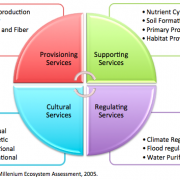Combating Climate Change in Nepal
 How can mobile phones address issues raised by a changing climate? A study by Shrandha Giri and Yuwan Malakar of the University of Manchester with support of the International Development Research Centre (IDRC) looks at a successful campaign in Nepal that takes advantage of the widespread usage of mobile phones.
How can mobile phones address issues raised by a changing climate? A study by Shrandha Giri and Yuwan Malakar of the University of Manchester with support of the International Development Research Centre (IDRC) looks at a successful campaign in Nepal that takes advantage of the widespread usage of mobile phones.
Greater variation in precipitation, higher average temperatures, and a fragile geography prone to flooding have been noted by Nepalese farmers as signs of climate change. In light of these concerns, a phone-based early warning system was created to exchange information on flood signs and other occurrences among communities. The system also provides a list of service providers and traders in the agricultural field. The study notes three critical ways in which mobile phones benefit these farmers:
1. Agricultural Practices: alongside the typical problems of low-productivity agricultural practices and poor access to inputs, farmers in the villages are also reporting with a presumed link to climate change the arrival of new pests and diseases about which they have limited knowledge. This has affected the level of outputs because of the novelty of these challenges and the lack of availability of local agricultural technicians. The project provides the farmers with the phone contacts of technical service providers, which they have then used to get advice about treating crops and livestock. They also use this service for more general advice on seed varieties, planting times and methods with the aim of raising incomes and thus reducing vulnerabilities.
2. Market Prices: in order to reach the nearest market, farmers in Kirtipur have to walk 10km along a train route and then travel a further 5km by bus. Because of the higher costs of reaching other markets and complete uncertainty about prices in those markets, farmers would always sell in the nearest market at whatever price the local traders would offer. With climate change and flooding potentially suppressing the level of outputs they could achieve, this was a severe threat to income levels. The project therefore also provided the farmers with a phone contact list of agricultural traders in a number of nearby markets. As a result, not only are they better informed about reasonable market price levels for their outputs, they can also compare prices between traders and justify journeys to whichever trader is offering them the best price.
3. Disaster Early Warning: Flooding, particularly the recent growth in occurrences and severity which is assumed to be linked to climate change, causes problems to the farmers in loss of crops and livestock, inability to access markets when there are landslides, and more general dangers to life and property. The project provided a phone list of key contacts in both upstream and downstream communities. When there is continuous heavy rain, those in the upstream areas phone and warn those in the downstream communities, who are then able to prepare and evacuate livestock, property, family, etc. They also warn about landslides that may block planned transport routes. In return, those in the downstream, more populated, better connected and more commercial areas, provide information on markets, agricultural practice and development opportunities.
 The information needed to create this network was provided through a participatory vulnerability assessment (PVA) conducted by Practical Action, village development committees, and agricultural groups affiliated with government district offices. In this survey farmers noted the changing dry season, erratic rainfall, and movement of farmers due to a lack of irrigation. The project is deemed successful because it involved local people’s motivations such as financial gain. The use of ICTs reduces vulnerabilities and makes communities more resistant and perhaps productive by mitigating long-term changes in the local climate.
The information needed to create this network was provided through a participatory vulnerability assessment (PVA) conducted by Practical Action, village development committees, and agricultural groups affiliated with government district offices. In this survey farmers noted the changing dry season, erratic rainfall, and movement of farmers due to a lack of irrigation. The project is deemed successful because it involved local people’s motivations such as financial gain. The use of ICTs reduces vulnerabilities and makes communities more resistant and perhaps productive by mitigating long-term changes in the local climate.





































